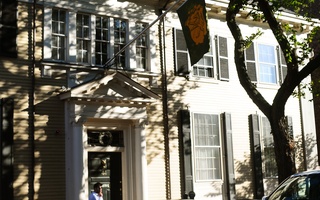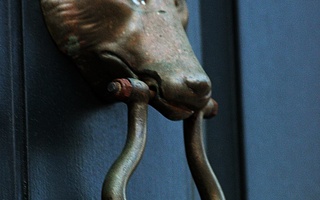{shortcode-b9b0e14c1fdf52d41ddc654ab12c3d2c7e65cdc5}UPDATED: October 26, 2015, at 1:43 p.m.
The Fox Club’s recent decision to accept a group of women into its all-male membership follows student members’ growing support for going co-ed and, more recently, an extended back and forth with Harvard administrators that left the club’s undergraduate leadership feeling that its hand was “forced.”
The Fox’s thinking, detailed by its undergraduate leaders in a letter to club graduates courting their support, seems to have evolved over at least the last year but accelerated this fall, when administrators increased public scrutiny on Harvard’s final clubs and their single-gender makeups. The Crimson obtained the letter, dated Oct. 19, on Sunday.
The Fox, one of Harvard’s eight male final clubs, is not formally affiliated with the University, but according to the letter, undergraduate members feared repercussions from administrators if the club remained single-sex. Specifically, the letter indicated that members of the Fox, in addition to themselves wanting to go co-ed, believed that Harvard had imposed a Nov. 1 deadline on them to formulate plans to admit women.
“Independently of the undergraduates’ sincere desire to admit women, Harvard University has applied tremendous pressure on all of the clubs to go coed. We now believe that our individual reputations and careers, as well as the reputation, autonomy and existence of the Fox Club going forward, are at serious risk if we do not act by November 1,” the club’s undergraduate officers wrote in the letter, under the section heading “Harvard Has Forced Our Hand.”
‘WILL SHE BE MY FRIEND?’
Late Saturday evening, the undergraduate leaders of the Fox Club informed prospective members via email that some junior and senior women had accepted offers to join the formerly all-male group, meaning that the 117-year-old institution for the first time had gone co-ed.
That email message, according to the Oct. 19 letter, was just one step in a calculated plan—one that included multiple votes of the club’s undergraduate membership and an unorthodox initiation process, but not necessarily a formal vote of approval from its graduate board ahead of time. The letter suggests some discord between the undergraduate and graduate members of the club, with the writers indicating that “some within our own graduate community have questioned our motives or grasp of the facts.”
The letter, which first details the group’s reasons for going co-ed, emphasizes that Fox Club undergraduates wanted to add women to club membership independent of Harvard’s actions. Long before the club admitted its first women this fall, a group of Fox undergraduates drafted a report on the prospects of going co-ed, according to the letter, signed by five Fox Club officers: President Daniel T. Skarzynski ’16, Vice President Patrick E. Dowling ’16, Treasurer Matthew T. Barber ’16, Secretary Lev E. Ratnofsky ’16, and Librarian Cameron R. F. Clemence ’16. {shortcode-1accca6f05de61af6a96a3c83e1e73ce9c30a750}
“Work on this report began well before Harvard started applying pressure upon the clubs to make that change,” the officers wrote. “It was an internal process begun by members who felt simply that it was the right thing to do.”
More recently, this September, the undergraduate membership held a vote on the issue: More than 80 percent voted in favor of going co-ed, according to the letter.
Some time later, Fox undergraduates voted again, this time to “select the Fox’s first prospective class of women, a group of Junior and Senior women leaders who embody Fox values” and would “provide a female presence during a special female punch and initiation” next spring.
According to the letter, the undergraduates voted to go co-ed, this time approving the measure unanimously. The prospective female members were selected based on one criterion that the letter suggests is club tradition: “Will she be my friend?”
The letter—which the club’s undergraduate officers confirmed to The Crimson on Sunday that they sent to club graduates—informs alumni of the change. It makes no suggestion that the club’s graduate board had voted to approve selecting women to join first.
The undergraduates, the officers wrote, intended to extend offers of membership to 10 women, and those who accepted their offers would be initiated and admitted by the end of the month. That initiation, according to the letter, would be “abridged” and “focus on the tradition and values of the Fox, while eliminating any activities with the potential to be ill-received by the female initiates.”
The club’s first female members would attend a formal initiation dinner on Oct. 31, likely ahead of the conclusion of the fall punch process, and “be able to witness a full initiation as the new class of males is initiated, giving them the ability to provide suggestions as to how it could be adjusted for future female members, while still retaining as many traditions as possible,” the officers wrote.
The women who join the Fox may retain membership both there and in a female final club if they are already members, according to the letter, although the officers noted that future classes of women could not dually enroll.
“Aside from this, these women will be treated the same as any member once admitted, subject to all the same rules, and afforded all the same privileges,” the five students wrote.
“The Fox now has an opportunity to gain an impressive class of women Foxes, women you all would be proud to count as fellow members,” the undergraduate officers wrote to club graduates. “If we make them members now, we allow them to learn from this year’s upcoming initiation, and begin laying the groundwork for a successful integration in which the Fox remains a strong and respected institution at Harvard.”
‘THE FOX CLUB ITSELF IN DANGER’
But as much as the Oct. 19 letter frames the Fox undergraduates’ decision as one of their own volition, it also makes clear that members feared severe repercussions from Harvard if they did not act on an expedited timetable. The undergraduate officers wrote that they lacked time for a formal graduate board vote in the face of administrative demands that they go co-ed.
Administrators have recently reiterated their beliefs in public comments that single-sex social organizations—most currently unrecognized by Harvard—have no place at the College. But in private, according to the Fox letter, they may have gone even further.
In a section of the letter headlined “Harvard Has Forced Our Hand,” the Fox undergraduates wrote that they and their graduate board counterparts had met with Dean of the College Rakesh Khurana, a vocal critic of final clubs, multiple times.
In those meetings, they wrote, “he has been very clear” that top officials, including University President Drew G. Faust, “have made it their mission to address sexual assault on campus, and open up the social scene to students of all genders, and that the university’s chosen method of doing so is to push the final clubs to go coed.”
The letter contends that Khurana, citing concerns about sexual assault on campus, told Fox members that Harvard is preparing a report that will “address the University’s plan to change the culture around sexual assault and gender equity on campus,” to be released before the start of next semester.
Although the Fox letter suggests that Harvard’s Board of Overseers will author that document, it more likely refers to the upcoming report of the University’s sexual assault prevention task force, chaired by former provost Steven E. Hyman. Faust expects a detailed report in January from that group in response to the recent release of Harvard’s sobering sexual conduct climate survey results, which administrators saw as implicating final clubs.
Ahead of that report, the Fox officers told club graduates in the Oct. 19 letter, they believed that they needed to go co-ed soon, or face consequences. Naming a perceived deadline of Nov. 1, the club members wrote that they believed that they had to admit women before Khurana submitted a set of recommendations to the authors of the final report, or they would face negative portrayal in it.
“If the Fox Club does not become a coed club, it will be categorized with all the other clubs when Harvard releases qualitative sexual assault information (except the Spee, which is already coed, and the Delphic, if it finalizes its merger with a women's club before November 1),” the letter said.
The Spee Club invited women to participate in its punch process in September. The Delphic Club, according to undergraduate president Joe F. Barbato ’16, has met with the presidents of some female final clubs to “gauge interest” in merging, but has made no decision about going co-ed.
Although whether Harvard would actually take such an action is unclear, the Fox letter indicates that its undergraduate leaders feared that administrators would force them to go co-ed if they did not this month, potentially by requiring students to disaffiliate from male final clubs as a condition of enrollment.
There is precedent for such a move, and in interviews, Khurana has refused to rule out the option; he has largely remained silent on any role he has played in pushing final clubs to change. In public, Khurana has said administrators are encouraging unrecognized social organizations to reevaluate their traditions, while maintaining that the College is not driven by notions of sanctions.
On Sunday, The Crimson provided Khurana with a copy of the Oct. 19 Fox letter so that he could dispute any statements ascribed to him prior to this story’s publication. He refused to dispute or comment on the Fox’s characterization of his actions. In an interview last week, Khurana also declined to confirm or deny whether he has requested that male final club leaders submit plans for going co-ed.
Although Khurana has alluded to preparing a set of recommendations about the College’s social scene, he has declined to provide many specifics. He did not directly respond to a question about whether members of the Harvard Corporation would review his recommendations, but he wrote in an email Sunday that “any document meant to describe potential policy changes would need to be reviewed [by] multiple stakeholders,” adding that he does not believe a document of the type has “received that type of review.”
“Throughout this process we have done our best to keep the leadership of the University informed,” Khurana wrote.
Fox undergraduates, clearly, worry that Harvard could threaten the club’s existence: “Failure to act now also places the Fox Club itself in danger,” they wrote on Oct. 19.
“Harvard is unfairly scapegoating the final clubs for Harvard’s poor performance on sexual assault issues,” the undergraduate officers added, but they maintained that the pressure was “real” and necessitated action.
“[I]n order to preserve the reputation of the organization to future prospective members, both male and female, to protect the undergraduate members from disciplinary action by Harvard, to protect the reputation of the graduate and undergraduate members regarding sexual assault, and to allow the Fox Club to survive and thrive as a place for friendship, for social education, and for bringing together men and women of high standards and congenial tastes, we need to make this transition before November 1,” they concluded.
The undergraduate officers of the Fox finished their letter with a plea to club graduates for support as they moved ahead to include women in the organization. Alluding to some graduate pushback and suggesting that some alumni had “openly discussed permanently shuttering the club or transforming it into a graduate-only institution” in the face of the mounting administrative pressure, the undergraduates advocated their alternative solution of admitting women.
“We therefore pray for your confidence, your trust and your support,” they wrote.
—Staff writer Noah J. Delwiche can be reached at noah.delwiche@thecrimson.com. Follow him on Twitter @ndelwiche.
—Staff writer Theodore R. Delwiche can be reached at theodore.delwiche@thecrimson.com. Follow him on Twitter @trdelwic.
Read more in College News
UC Votes To Publicize Harvard-Yale Shuttles















